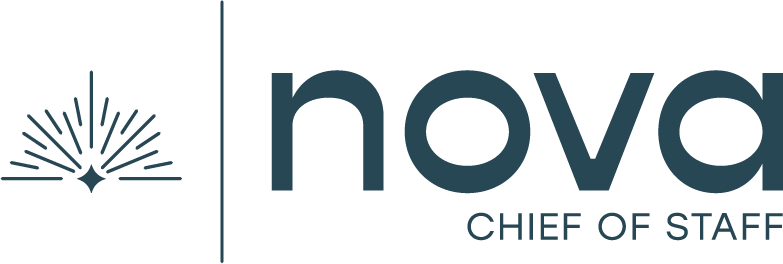Why Hiring a Chief of Staff IS ‘Founder Mode’
Author: Maggie Olson, Founder, Nova Chief of Staff
Founder mode vs. manager mode is suddenly the hottest topic in the startup world. After Airbnb co-founder and CEO, Brian Chesky, shared his transformative leadership journey at a Y Combinator event last week, Paul Graham, YC's co-founder, wrote this article, summarizing Chesky's story.
Graham argues that there are only two ways to run your company. Founder mode: hands-on, involved in every objective your team is working on, no task too small, holding employee hands at every step to ensure your vision comes to life. And manager mode: hire leaders to help you scale, delegate the work, worry less about how it gets done, and essentially, hands-off.
The founder mode concept is catching fire in business circles because—if it’s truly the key to business success—it breaks the commonly understood principle that to scale, leaders must separate from the day-to-day operations of the company.
The Grey Area
Nothing is ever ‘black or white,’ and in this case, it’s not as simple as choosing between founder mode and manager mode for leaders, as Graham states.
Instead, operating a company is a delicate balance between ownership, trust, engagement, strategy, operations, and much more. When founders are also great leaders—which should not be an assumed correlation—they are intentionally walking the leadership tightrope between micromanagement and empowerment of their people. Between the leader’s responsibility of setting the company vision and (the equally as important) tactics of exactly how to execute it.
Founder Mode, Flawed
Founder mode is not about the founder being involved in every single aspect of the business, but instead, having their influence felt and magnified across every single aspect of the business. When analyzing a founder’s time, no one will argue that it’s finite: regardless of what the founder decides to spend their time on, there will be tradeoffs elsewhere. While it may sound unorthodox to suggest that founders should be writing the company ops guides, designing the website, and answering all customer emails… we must ask, to what end? It’s impossible for a founder to spend enough time on the most important aspects of their role (vision, growth, strategy, and leadership) if they choose to spend their time doing the work of junior employees.
Enter “Delegation”
But delegation is not easy, and this pillar of ‘manager mode’ is most often implemented with great opportunity. Manager mode suggests, and I agree, that company leaders who merely hire and then pass off important initiatives without remaining involved will fail. Delegation is not a buzzword: it’s a practiced leadership tactic that takes years to refine into expertise. It involves multi-faceted communication, change management, thoughtful transition, the right timing, and excellent execution. Skills requiring intentional nurturing and practice, or… a Chief of Staff
A Chief of Staff IS founder mode.
The Chief of Staff role is designed to amplify the leader’s message, lead their most important initiatives, be the eyes and ears of team culture, identify and enable processes, and drive efficiency across the business—all on behalf of the leader. A leader can’t simply choose founder mode or manager mode, and a Chief of Staff is the bridge between the two.
A Chief of Staff exists to keep the founder focused on what’s most important: company vision, growth, and strategy. And while business experts would agree that a leader must spend adequate time on the 10k foot view of their business, Chesky, Graham, and all of Silicon Valley are talking about founder mode for a reason: there must also be a fanatical focus on the execution—the daily operations—to find success in any business, especially a new one.
The answer is ensuring the amplification of the founder’s influence and vision throughout the company. This is exactly what a Chief of Staff is designed to do: magnify the effect and influence of the founder.
The Founder Mode Effect
Founder mode gets it wrong, but the ‘founder effect’ gets it right. Founders will find success walking the line between micromanagement and delegation, between empowerment and handholding, when they have a Chief of Staff to carry forward their initiatives, execute them excellently, and amplify their vision across their executive team and the company. To push their most important priorities forward, to drive alignment on what’s most important, to deliver the leader necessary information without them asking for it, and to help them stay in the vision and growth space—crucial for business leaders at any stage.
Have you hired your Chief of Staff yet? Learn more about Nova’s Chief of Staff Certification course by downloading our syllabus. Nova also offers a suite of coaching packages tailored to the Chief of Staff role.
More About Nova Chief of Staff
As the Founder of Nova Chief of Staff, it’s no secret that I believe strongly in the role. But don’t just take my word for it. The role is catching like fire as word spreads about its impact: business leaders are telling their friends about the power of a Chief of Staff. We will look back on this generation and identify the CoS role as one of the most impactful positions of our time. Leaders have long known they need administrative support, but a highly skilled, strategic, execution-focused right-hand to the leader, focused on their most important initiatives? It’s a no-brainer. Business leaders across all sectors and company sizes are catching on, hiring their own Chiefs of Staff.
Nova Chief of Staff is the premier destination for Chief of Staff education, development, consulting, coaching, and more. Interested in learning about Nova? Visit www.novachiefofstaff.com or reach out to us at hello@novachiefofstaff.com

